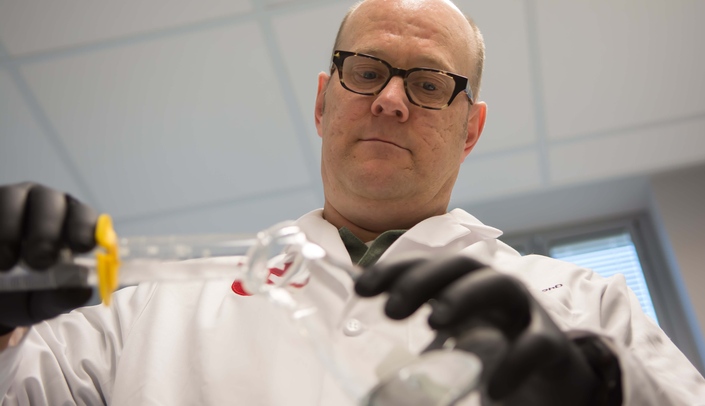Corey Hopkins, Ph.D., associate professor of pharmaceutical science at the University of Nebraska Medical Center College of Pharmacy, is the lead medicinal chemist and co-author on a Dec. 7 study in Science describing a potential new approach to preventing death in essential kidney cells.
Researchers found that a new compound, which originated in Dr. Hopkins’ lab in the UNMC Center for Drug Discovery, not only stopped the loss of these cells, but also restored kidney function, in animal models.
Dr. Hopkins and his UNMC research team were part of a multi-institutional collaboration, which includes the Broad Institute of MIT and Harvard, Brigham and Women’s Hospital, and Harvard Medical School.
Progressive kidney diseases – whether genetic, or caused by chronic conditions such as obesity or hypertension – are devastating, and affect millions. There has been very little progress in kidney disease therapeutics in the last 40 years.
“We attacked the problem from the biology of the genetic disease,” said the study’s senior author, Anna Greka, M.D., Ph.D., an institute member of the Broad Institute of MIT and Harvard. “And we think we’ve actually found what might be a shared pathway for kidney failure – and a potential way to treat it.”
That potential treatment is a new compound, called AC1903. The A is for Anna Greka.
The C is for Corey Hopkins.
The “pathway” to kidney disease is the dominoes-falling activation of proteins that in turn kills essential cells. The researchers designed and tested a variety of compounds to find one that could chemically block this process.
At Dr. Hopkins’ UNMC lab, they found AC1903.
“It is exciting to see our work move forward from a basic science research program to a potential future therapy,” Dr. Hopkins said.
It’s especially exciting that while they originally tested the compound on a rare-genetics form of kidney disease, the researchers also found that AC1903 was similarly effective on other forms of kidney disease – even those caused by hypertension, and even at advanced stages.
“Of course, we now need to test (protein) inhibitors in clinical studies in patients, but the results are very exciting,” Dr. Greka said. “I’m delighted that our team has contributed to this finally approaching a reality.”
“This is groundbreaking work that has tremendous potential to advance treatment of progressive kidney diseases,” said Courtney Fletcher, Pharm.D., dean of the UNMC College of Pharmacy. “This example of new drug discovery for neglected diseases is precisely the vision of improving health through innovative research, which led to the creation and construction of the UNMC Center for Drug Discovery.”
We are Nebraska Medicine and UNMC. Our mission is to lead the world in transforming lives to create a healthy future for all individuals and communities through premier educational programs, innovative research and extraordinary patient care.
Twitter | Facebook | Instagram | YouTube | Flickr
